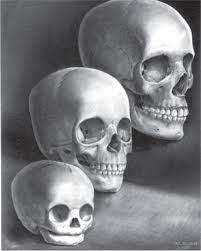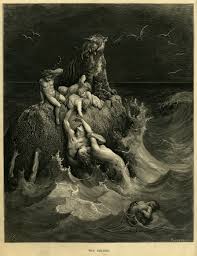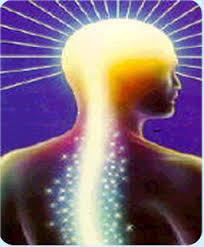Was probably one of the most difficult, and yet the most easy of feats that we will ever accomplish in a life. As a child we identified with our own nature. We intuitively realized that our being was immersed in and a part of the process of growth.
No amount of intellectual information, no accumulation of facts however vast, could give you the inner knowledge necessary to accomplish the physical events involved in that growth process. We learn to read, but the seeing itself is an accomplishment of far greater magnitude — one that seemingly happens all by itself. It happens because each of us is again, indeed a part of nature and of nature’s source.
In various ways our religions have always implied our relationship with nature’s source, even though they often divorced nature herself from any upon or another quite valid perception, but then distorted it, excluding anything else that did not seem to fit. “We are children of the universe.” This is an often-heard sentence — and yet the main point of the Christ story was not Christ’s death, but his birth, and the often-stated proposition that each person was indeed “a child of the father.”
There are many later-appended references in the Bible, such as the fig tree story, in which nature is played down. Christ’s “father” was, however, the God who was indeed aware of every sparrow that fell, who knew of every creature’s existence, whatever its species or kind. The story of the shepherds and flocks comes much closer to Christ’s intent, where each creature looked out for the others.
The officials of the Roman Catholic Church altered many records — cleansing them, in their terms, of anything that might suggest pagan practices, or nature worship as they thought of it. In terms of our civilization, nature and spirit became divided so that we encounter the events of our lives largely in that context. To some degree or another, we must feel divorced from our bodies and from the events of nature. The great sweeps of emotional identification with nature itself do not sustain us, therefore. We study those processes as if we somehow stood apart from them.
To some extent our society’s beliefs allow us enough freedom so that most of us trust our bodies while they are growing toward adulthood. Then, however, many of us no longer rely often upon the processes of life with us. Certain scientific treatises often make us believe that the attainment of our adulthood has little purpose, except to insure the further existence of the species through parenthood — when nature is then quite willing to dispense with our services. We are quite simply told that we have no other purpose. The species itself must then appear to have no reason except a mindless determination to exist. The religions do insist that man has a purpose, yet in their own confusion they often speak as if that purpose must be achieved by denying the physical body in which man and woman have his or her life’s existence, or by “rising above” “gross, blunted,” earthly characteristics. In both cases man’s and woman’s nature, and nature in general, take short shrift.
Such tales are myths. They do indeed have power and strength. In those terms they represent the darker side of myths, however — yet through their casts we presently view our world. We will interpret the private events of our lives, and the spectacular range of history, in the light of those assumptions about reality. They not only color our experience, but we create those events that more or less conform to those assumptions.
Those who “lose” their lives in natural disasters become victims of nature. We see in such stories examples of meaningless deaths, and further proof of nature’s indifference to man and woman. We may, on the other hand, see the vengeful hand of an angry God in such instances, where the deity once again use nature to bring man and woman to his or her knees. Man’s and woman’s nature is to live and to die. Death is not an affront to life, but means it continuation — not only inside the framework of nature as we understand it, but in terms of nature’s source. It is, of course, natural then to die.
The natural contours of our psyche are quite aware of the inner sweep and flow of our life, and its relationship with every other creature alive. Intuitively, each person is born with the knowledge that he or she is not only worthwhile, but fits into the context of the universe in the most precise and beautiful of fashions. The most elegant timing in involved in each individual’s birth and death. The exquisite play of our own inner nature in general — and that identification leads us into deeper knowledge of our own part in nature’s source.
The myths upon which we base our lives so program our existence that often we verbally deny what we inwardly know. when people are hurt in a natural disaster, for example, they will often profess to have no idea at all for such involvement. They will ignore or deny the inner feelings that alone would give the event any meaning in their lives. The reasons for such involvement would be endless, or course — all valid, yet in each and every case, man/woman and nature in those terms would meet in an encounter that had meaning, from the largest global effects to the smallest, most private aspects of the individuals involved. We have made certain divisions because of our myths, or course, that make this kind of explanation extremely important and difficult. We think of rain or earthquakes as natural events, for example, while we do not consider thoughts or emotions as natural events in the same terms. Therefore it is difficult for us to see how there can be any valid interactions between, say, emotional states and physical ones.
We might say: “Of course, I realize that the weather affects my mood,” yet it will occur to very few of us that our moods have any effect upon the weather. We have so concentrated upon the categorization, delineation, and exploration of the objective world that it surely seems to be “the only real one.” It seems to exert force or pressure against us, or to impinge upon us, or at least almost to happen by itself, so that we sometimes feel powerless against it. Our myths have given great energy to the outsideness of things.
In exasperation some of us see nature as good and enduring, filled with an innocence and joy, while on the other hand we envision man and woman as a bastard species, a blight upon the face of the earth, a creature bound to do everything wrong regardless of any strong good intent. Therefore we do not trust man’s or woman’s nature either.
Those involved in such disasters — the survivors — often use such “larger-than-life” circumstances in order to participate in affairs that seem to have greater import than those possessed by previous humdrum existences. They seek the excitement, whatever its consequences. They become a part of history to whatever extent. For once their private lives are identified with a greater source — and from it many derive new strength and vitality. Social barriers are dropped, economic positions forgotten. The range of private emotions is given greater, fuller, sweep.
To some extent or another man’s and woman’s desires and emotions merge with the physical aspects of nature as we understand it, so that such storms or disasters as as much the result of psychological activity as they are of weather conditions.
30px;”>
Obviously — whatever the appearances — storms, earthquakes, floods, are quite necessary to the well-being of the earth. Both man’s and woman’s and nature’s purposes are served, then, though generally speaking man’s and woman’s myths make him blind to those interactions. People’s thoughts and emotions always give clear clues whenever illness is involved, yet most people ignore such information. They censor their own thoughts. Many therefore “fall prey” to epidemics of one kind or another because they want to, though they might deny this quite vigorously.
I am speaking particularly of epidemics that are less than deadly, though danger is involved. In our times, hospitals, we must realize, are important parts of the community. They provide a social as well as a medical service. Many people are simply lonely, or overworked. Some are rebelling against commonly held ideas of competition. Flu epidemics become social excuses for much needed rest, therefore, and serve as face-saving devices so that the individuals can hide from themselves their inner difficulties. In a way, such epidemics provide their own kind of fellowship — giving common meeting grounds for those of disparate circumstances. The [epidemics] serve as accepted states of illness, in which people are given as excuse for the rest or quiet self-examination they desperately need but do not feel entitled to otherwise.
I do not mean to assign any hint of accusation against those so involved, but mainly to state some of the reasons for such behavior. If we do not trust our nature, then any illness or indisposition will be interpreted as an onslaught against health. Our body faithfully reflects our inner psychological reality. The nature of our emotions means that in the course of a lifetime we will experience the full range of feelings. Our subjective state has variety. Sometimes sad or depressing thoughts provide a refreshing change of pace, leading us to periods of quiet reflection, and to a quieting of the body so that it rests.
Fears, sometimes even seemingly irrational ones, can serve to rouse the body if we have been too lethargic, or have been in a rut psychologically or physically. If we trusted our nature we would be able to trust such feelings, and following their own rhythms and routes they would change into others. Ideally even illnesses are a part of the body’s health, representing needed adjustments, and also following the needs of the subjective person at any given time. They are a part of the interplay between the body and mind, or spirit.
The majority of my readers have come down with one or another disease usually considered very dangerous, and without ever knowing it, because the body healed itself normally and naturally. The disease was not labeled. It was not given recognition as a condition. Worries or fears were not aroused, yet the disease came and vanished.
In such instances natural healing processes occurred, for which the body is seldom given credit. Such healings do not just involve changes in the body, for example, for a physical healing can take place because of events that seem utterly disconnected.
Some portions of each individual is in direct contact with the very source of its own existence. Each individual is innately aware that help is available in every situation, and that information does not need to come through the physical senses alone. Many illnesses are cured, then, through quite natural methods that not only involve physical healings, but bring into play other events –events that have great bearing on the psychological elements that may be involved behind the scenes. For those interactions we will have to look to Frame-mind-2.












